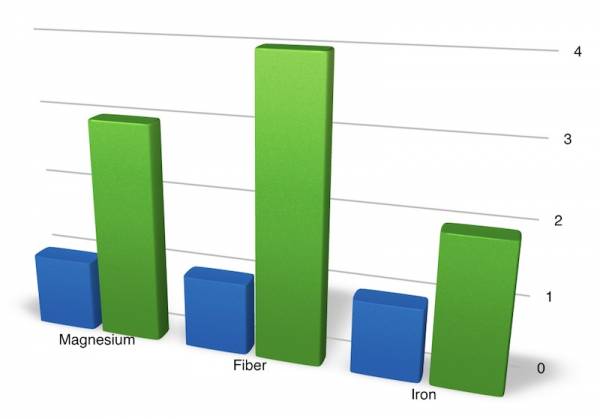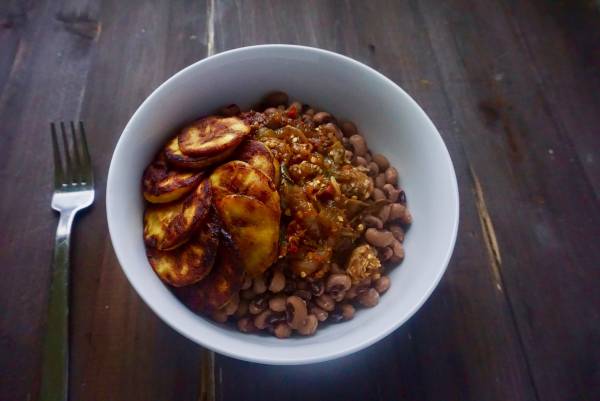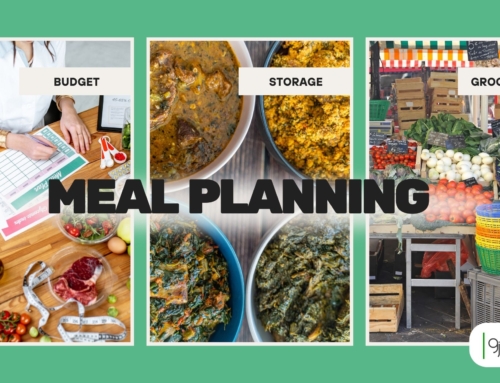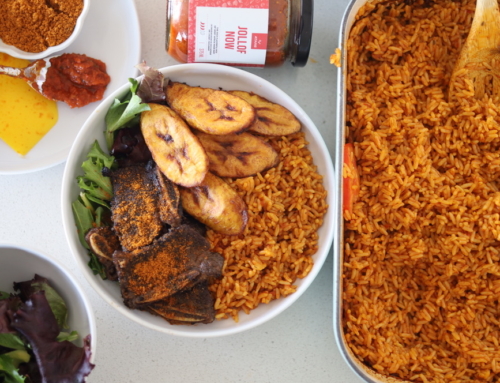Does Nigerian food make you fat? This is a question I often get from readers of this blog. In an attempt to provide varying perspectives to this question your favourite Nigerian Food bloggers :) came together to answer it. You will find interesting perspectives from these amazing food blogger by clicking through to their blogs:
Does Nigerian Food Really Make You Fat?
Short answer, No!
Nigerian food does not make you fat, overeating Nigerian food makes you fat. No matter how good or wholesome a diet, if you consume too much of it you will get fat. Granted it’s easier to overeat rice than it is to overeat salad, however both play important roles in overall cardiovascular health.
Aside from those with serious health conditions, most people gain weight as a result of overeating. To lose or gain weight on any diet, science dictates that caloric imbalance must occur. Most people think Nigerian food particularly “cause” weight gain because most meals are built around carbohydrate. This is untrue, carbohydrates on their own don’t just make you fat, eating too much of the wrong type of carbohydrate is the problem. The traditional Nigerian diet is very rich is complex healthy carbohydrates which actually help with long term weight and belly fat loss when consumed in the right quantity.
So what exactly is the right quantity?
This will differ from person to person. For example, someone who walks 5k to and from work daily might be able to eat fufu for breakfast lunch and supper without gaining weight. Whereas, someone who is driven around with an office job might not be able to afford the same eating pattern without gaining lots of weight. To understand the right amount of food needed, factors such as age, height, physical activity levels, sex etc must be considered. I detailed how to calculate and customize Nigerian meals based on personal needs on page 11 of my healthy Nigerian recipe cookbook Lose It Nigerian.
When it comes to weight gain or loss on a Nigerian diet, the following two factors are at play
- Portion size
- Mode of cooking
To lose weight, you need to practice both portion control and adopt healthy cooking styles. For example you can make a completely delicious pot of okro soup to have only 1000 calories, you can also make the same pot with over 3000 calories depending on your choice of ingredients. Even if you might not be eating too much, you might be eating concentrated calories which will still lead to weight gain. This is what I set out to teach in the Lose It Nigerian cookbook, simple ways to modify traditional Nigerian recipes at low caloric point in order to consume proper portion size that will keep you full.
There are several elements of Nigerian cooking that can take a seemingly healthy regular calorie meal to a high calorie meal. Examples include:
- Deep frying
- Abundant use of oil
- Use of various high fat protein sources in one meal
To avoid gaining weight on a Nigerian diet, the following two things must be kept in mind.
- Understand how calories work
- Be mindful of methods of preparing meals
By knowing exactly how many calories you should be eating, you are able to make more informed decisions on how much food and what type of food you should be eating. Also, simple modifications like those listed below will help reduce overall caloric content of meals.
1. Stews
The way stew is prepared can easily make it one of the worst offenders; the presence of oil and fried meat in most stews is enough to drive calories and fat content overboard. Simple modification on stews would be:
- Eliminate the use of additional oil, meat has lots of naturally occurring oil
- Replace fried meat with roasted meat
- Make use of fresh fish, goat and chicken. These are leaner protein sources
- Add some ponmon to enhance the “meatyness” at lower calories
2. Rice
Rice being a grain is fundamentally healthy, where rice offends on the diet scale is in the use of “white Rice”. White rice can simply be described as “Empty food” as it is nutritionally void, low in fiber and other essential vitamins.
The simplest modification on rice would be replacing white rice with Brown rice. Brown rice has 3 x the magnesium, 2 x the iron and 4 x the Fiber (which is essential for keeping you fuller longer).

White vs Brown Rice
3. Soups and sauces
The basic composition of most soups are similar (earthy broth with meat and fish plus vegetable), again this should be fundamentally healthy but two main factors affect the health composition of most stews and sauces;
- the use of excessive oil
- the presence of excessive high fat proteins
Although most of the calories from protein are healthy; excessive consumption can lead to weight gain and other health risks. Some modifications to make soups healthier include:
- Reduce the amount of oil used (a good trick is to add oil after cooking not prior)
- Be mindful of the amount of fatty proteins added (cow meat is a huge culprit)
- Use more goat meat and chicken
- Use a variety of vegetables for greater health benefits
- Replace frozen/ dried vegetables with fresh ones that are in season






Great read.
In eating fresh fish, all fish types are to be eaten
Everything in moderation as they say. I enjoy oilless stews these days
well said
I suspect the main culprit of fat and related issues is really carbohydrates -They turn to sugar and the excess gets stored in the body as fat and also they don’t tend to be nutrient dense unlike green leafy vegetables.
http://nutritiondata.self.com/facts/cereal-grains-and-pasta/5712/2
http://nutritiondata.self.com/facts/cereal-grains-and-pasta/5707/2
http://nutritiondata.self.com/facts/vegetables-and-vegetable-products/2627/2
One can not tell me that, unless he/she don’tkonw the proper time to eat and what to eat as well. (Thisame time.)
Calorie counting of our native foods is really needed. I wish the Government can seriously look into this. Thanks for the insights.
absolutely.
Portion . Portion . Portion control. It can never be over emphasized.
It’s so obvious yet we look for the cause of weight gain elsewhere. Maybe we need to start adding self control somewhere in there. :D
Thanks Ronke for the tips on improving our Nigerian food preparation methods. We are so used to preparing meals with certain ingredients (especially oil) that the absence of it in a recipe throws some of us off balance. I recently uploaded a Turmeric Rice recipe and I did not add vegetable oil because I used chicken stock which contains enough chicken oil to cook the meal with. A good number of people kept pointing out that I forgot to add oil and when I tell them the reason, they get it instantly. We really need more education on the actual contents of some ingredients. There’s a lot of redundancy going on.
So my people una don hear am, our LIN Madam has spoken, hear ye her and go purchase her LIN Cookbook so that you can start busting those myths about Nigerian food making you fat.
Hahahha.. very well said aunty Flo! we need overall re-education.